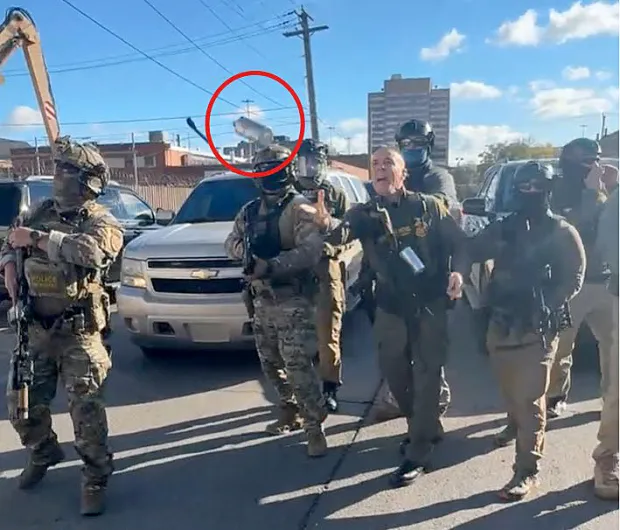
Federal Judge Forces Border Patrol Chief Greg Bovino to Face the Music After Alleged Tear Gas Incident
In a dramatic escalation of judicial oversight, a federal judge has delivered an unambiguous summons: Border Patrol Chief Greg Bovino, the public face of Chicago’s controversial Operation Midway Blitz, must appear in court, in person, this Tuesday [2]. His mandate? To explain himself after being accused of lobbing tear gas into a crowd in Chicago’s Little Village neighborhood, an act attorneys assert constitutes a direct violation of a standing judicial order [1]. This isn’t just a routine court appearance; it’s a pointed demand for accountability, exposing what many see as a federal agency’s brazen disregard for the rule of law and the sanctity of judicial authority. It lays bare the unvarnished truth: even the highest-ranking federal officials are not above answering to the courts.
The facts are stark, stripped of the usual bureaucratic platitudes. Lawyers involved in a lawsuit concerning the use of force against journalists and peaceful protesters wasted no time, filing a notice of an alleged violation that puts Bovino squarely in the spotlight [1]. They contend that Bovino, during a tense standoff with residents this week, personally deployed at least one, possibly two, tear-gas canisters into a crowd [1], [4]. This aggressive maneuver, occurring in the midst of an already volatile situation, reportedly came less than 24 hours after a judge had taken explicit steps to scrutinize, and potentially curb, such tactics [2]. This isn’t mere conjecture; it’s an ironclad case built on an immediate response to a blatant transgression.
The Judiciary’s Unyielding Grip: No Room for Official Spin
Swift Justice: From Tear Gas to Court Order in Hours
The speed of the court’s response is itself a powerful statement. In a system often criticized for its deliberate pace, the federal judge acted with remarkable alacrity. The order for Bovino’s personal appearance arrived less than a full day after the alleged tear gas deployment in Little Village [2]. This isn’t the sort of response that allows for the careful crafting of an official narrative or the slow erosion of public memory. Instead, it signals an immediate, decisive challenge to what appears to be a direct affront to judicial authority.
When a top federal official, particularly one commanding a high-profile, often contentious operation, is accused of such a flagrant disregard for a court’s directive, it signals a systemic problem. It suggests a prevailing attitude of exceptionalism within certain federal agencies, a belief that their operations transcend the constraints of legal oversight. The judge, by demanding Bovino’s physical presence, isn’t just asserting procedural power; she’s stripping away that illusion of impunity, dragging accountability from the shadows of bureaucracy into the uncomfortable glare of the courtroom. The implication is clear: the law applies to everyone, regardless of the uniform or the perceived mission.
The Meticulous Case-Building: A Pre-Emptive Strike Against Defiance
It’s crucial to understand that this recent incident did not occur in a vacuum. Bovino’s methods and the aggressive tactics of the federal immigration agents under his command had already drawn significant judicial scrutiny. Just days prior, the same federal judge had taken the extraordinary step of more than doubling the time Bovino could be questioned under oath [3]. This extended questioning was specifically related to his involvement with immigration agents who had previously resorted to tear gas in confrontations [3]. The court was already meticulously building its case, actively seeking to understand and address the patterns of force employed by Operation Midway Blitz.
This context transforms the recent tear gas deployment from a potentially isolated misjudgment into what appears to be a brazen act of defiance. The judge had already been questioning officials for hours, dissecting the government’s immigration enforcement operations in Chicago [5]. Furthermore, she had explicitly ordered federal authorities to preserve all videos documenting agents’ use of tear gas, anticipating the need for objective evidence [5]. This foresight, this proactive demand for transparency, now stands as a direct, unassailable bulwark against any attempts to downplay, obfuscate, or deny Bovino’s alleged actions. The official spin, whatever form it attempts to take, will find itself quickly dismantled by the weight of meticulously gathered evidence and a judge who clearly doesn’t suffer fools lightly.
Operation Midway Blitz: A Culture of Confrontation Under Scrutiny
The Face of Force: When a Leader Gets Hands-On
Greg Bovino is not merely a name on an organizational chart. He is the visible, authoritative leader, the very face, of Operation Midway Blitz in Chicago. This operation has been a consistent flashpoint, fueling significant tension and controversy within local communities, particularly in neighborhoods like Little Village, which have borne the brunt of aggressive immigration enforcement tactics [1], [2]. When citizens confront federal agents, Bovino is the commanding figure they see, the emblem of federal authority.
And when that figurehead is accused of personally deploying chemical weapons into a crowd, it profoundly impacts public trust and shatters any pretense of measured, professional conduct. This isn’t about an order given from a safe distance; it’s about a senior officer allegedly engaging in direct, physical aggression. It speaks volumes about an institutional culture that might not only permit such actions but perhaps even implicitly encourages them, especially when legal directives are already in place to curb such excesses. It suggests a belief that direct confrontation, even with peaceful residents and journalists, is an acceptable operational choice, regardless of legal constraints or the human cost.
The Folly of Spin: A Narrative Crumbles Under Evidence
The immediate filing of an alleged violation by the attorneys involved underscores the profound gravity of the situation [1]. This isn’t just an accusation lobbed from the sidelines; it’s a direct legal challenge, supported by reports of Bovino himself deploying the canisters [1]. The fact that the court has already been so deeply engaged in scrutinizing the use of force by these agencies, questioning officials for hours and explicitly ordering video preservation [5], makes any attempt to construct an alternative, palatable narrative laughably futile.
Any official story, no matter how carefully constructed, will now face the unyielding glare of a federal judge armed with prior testimony and a clear record of concern. The expectation is not merely an explanation for the alleged actions, but a compelling justification for tactics that appear to directly flout established judicial authority. This hearing on Tuesday isn’t just about the personal accountability of Greg Bovino; it’s about sending an unequivocal message to all federal agents operating within the jurisdiction: the law applies to everyone, and the courts will not tolerate defiance. The spectacle of a senior federal officer being ordered to personally appear to account for his alleged contempt of a court order is a powerful testament to the limits of unchecked power. This is the unvarnished truth: the official spin is collapsing under the weight of judicial resolve, and the receipts are all in order.
What Happens Next: The Showdown on Tuesday and Beyond
Direct Accountability: The Judge’s Demanding Stance
The federal judge’s order for Bovino to attend the hearing in person is far more than a mere procedural formality. It is a calculated, strategic move designed to underscore the absolute seriousness of the alleged violation and to ensure direct, undeniable accountability [2]. There will be no proxies, no carefully worded statements delivered by legal counsel alone—Bovino himself must stand before the court, look the judge in the eye, and address the accusations. This direct engagement is not just critical for the integrity of the judicial process, but it is especially vital when dealing with federal agents who wield significant power and often operate under a perceived shield of executive authority. It forces a personal reckoning.
This hearing represents a pivotal moment in the ongoing legal battle concerning the appropriate use of force by federal immigration agents in Chicago. It’s an opportunity for the court to firmly reassert its authority and for the public to witness, firsthand, the vital mechanisms of checks and balances in action. The questions Bovino faces will undoubtedly be sharp, pointed, and relentless, probing not just the specifics of the incident itself but the underlying rationale and any institutional backing for such aggressive tactics. The judge is not asking; she is demanding answers, and the consequences of evasion will be severe.
Setting a Precedent: Beyond a Single Act of Defiance
While the immediate focus remains squarely on the alleged tear gas incident in Little Village, the implications of this hearing extend far beyond a single event. This case speaks to the broader, deeply entrenched struggle for effective oversight over federal law enforcement, particularly within the context of immigration enforcement—an area that has been consistently criticized for its aggressive stance and often opaque operations [1], [2], [3]. This judicial action could very well set a significant precedent, powerfully reinforcing the principle that no federal official, regardless of their rank, the uniform they wear, or the operational mandate they claim, is exempt from judicial review or, more fundamentally, above the law.
The communities in Little Village, and indeed across Chicago, will be watching closely as this unfolds. This isn’t just a legal proceeding; it’s a profound battle for transparency, for accountability, and for the fundamental right of residents and journalists to engage in peaceful protest without the threat of unwarranted chemical assault. The judge’s steadfast insistence on Bovino’s personal appearance sends an unambiguous signal: the era of operating with impunity, especially when a court has already drawn clear red lines and issued specific directives, is definitively over. This showdown on Tuesday is more than just a hearing; it’s a necessary correction, an assertion of justice that demands an honest accounting from those who swore to uphold the law, not defy it.
Sources & Footnotes
- https://blockclubchicago.org/2025/10/24/border-patrol-boss-bovino-tear-gasses-chicago-crowd-violating-judges-order-lawyers-say/ ↩
- https://news.wttw.com/2025/10/24/federal-judge-orders-border-patrol-chief-greg-bovino-who-fired-tear-gas-little-village ↩
- https://chicago.suntimes.com/immigration/2025/10/23/judge-allows-further-questioning-of-border-patrol-commander-greg-bovino-as-hes-hit-with-new-tear-gas-claims ↩
- https://www.cnn.com/2025/10/24/us/gregory-bovino-chicago-immigration-tear-gas-hnk ↩
- https://abc7chicago.com/post/ice-chicago-news-federal-judge-question-cbp-agents-use-force-tear-gas-hearing-monday/18042810/ ↩
- https://www.newsnationnow.com/crime/bovino-tear-gas-judges-order/ ↩

Leave a Reply